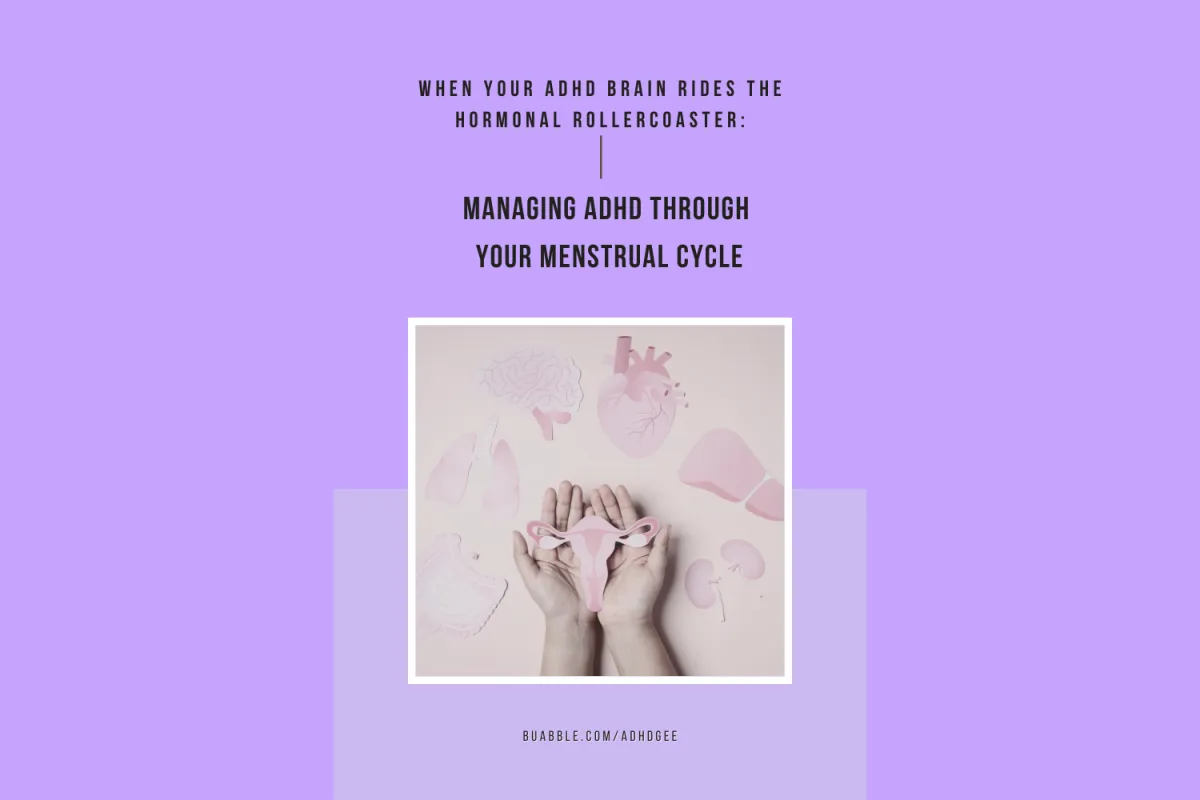
When Your ADHD Brain Rides the Hormonal Rollercoaster: Managing ADHD Through Your Menstrual Cycle
When Your ADHD Brain Rides the Hormonal Rollercoaster: Managing ADHD Through Your Menstrual Cycle
Ever notice how your ADHD medication feels like it's working perfectly one week, then completely abandons you the next? Or how you can tackle your to-do list like a productivity goddess around ovulation, but come pre-period, you're forgetting where you put your keys while holding them? You're not imagining things, and you're definitely not alone.
Research shows that ADHD symptoms may worsen the week before menstruation during declining estrogen and progesterone levels, creating a monthly pattern that many women mistake for personal failings rather than predictable neurobiological changes. Understanding this connection isn't just fascinating science, it's your roadmap to working with your body instead of against it.

The Hormone-Brain Connection: Why Your Cycle Matters
Your menstrual cycle isn't just about reproduction; it's a monthly neurochemical dance that directly impacts your ADHD brain. Estrogen interacts with brain receptors that manage the release of dopamine, serotonin, and norepinephrine, all neurotransmitters that play a pivotal role in mood regulation and attention processes. For ADHD brains already managing neurotransmitter imbalances, these hormonal fluctuations can feel like emotional and cognitive whiplash.
High-estrogen states generally equate to better mood and greater executive functioning, which explains why you might feel like your sharpest, most organised self around ovulation. Conversely, progesterone triggers the release of GABA, the main inhibitory neurotransmitter, which can cause a depressing effect that inhibits estrogen's positive effects.
Mapping Your Personal Symptom Cycle
The first step in managing cyclical ADHD symptoms is tracking them. Notice patterns across these phases:
Follicular Phase (Days 1-14): Rising estrogen often brings improved focus, better working memory, and increased motivation. This is your brain's "golden window" for tackling challenging projects.
Ovulation (Around Day 14): Peak estrogen levels may give you your month's best executive functioning. Channel this energy into planning and decision-making.
Luteal Phase (Days 15-28): Declining estrogen predicts problems with control and increases in approach behaviors including risk-taking. Emotional regulation becomes harder, and symptoms like impulsivity, forgetfulness, and emotional dysregulation intensify.
Strategic Management Through Each Phase
Medication Adjustments
Work with your healthcare provider to explore cycle-responsive medication strategies. Preliminary research demonstrates potential benefits of increasing premenstrual psychostimulant dosage in women with ADHD experiencing premenstrual worsening of symptoms. Some research shows heightened sensitivity to stimulants during the follicular phase when estrogen is high and progesterone is low.
Nutrition and Supplements
During your luteal phase, focus on blood sugar stability to support already challenged executive functioning. Complex carbohydrates paired with protein can help maintain steady energy levels when your brain feels scattered. Omega-3 fatty acids may help support neurotransmitter function throughout your cycle.
Magnesium supplementation can be particularly helpful during PMS, as it supports both muscle relaxation and neurotransmitter balance. B-vitamins, especially B6, may help with mood regulation during hormonal fluctuations.
Exercise Adaptations
Match your movement to your cycle's energy patterns. During high-estrogen phases, you might thrive with higher-intensity workouts that channel your elevated energy. As progesterone rises and energy dips, gentle yoga, walking, or swimming can provide movement without overwhelming an already taxed nervous system.
Sleep Strategies
Prioritise sleep hygiene especially during your luteal phase, when progesterone's sedating effects might disrupt your normal sleep patterns. Create a consistent bedtime routine, limit screen time before bed, and consider that your usual sleep schedule might need adjustment throughout your cycle.
Stress Management
Your luteal phase demands extra compassion and proactive stress management. This isn't the time to push through, it's the time to implement every coping strategy you know. Deep breathing exercises, mindfulness practices, and saying no to non-essential commitments become essential self-care, not optional luxuries.
Working With Your Waves
Rather than fighting your cycle's natural rhythms, consider cycle-syncing your life. Schedule important meetings and demanding projects during your follicular phase when possible. Use your luteal phase for routine tasks, self-reflection, and planning. Accept that some weeks you'll be a productivity powerhouse, and others you'll need extra grace and support systems.
The Path Forward
Understanding the relationship between your menstrual cycle and ADHD symptoms transforms monthly struggles from mysterious personal failings into manageable, predictable patterns. This knowledge empowers you to advocate for yourself with healthcare providers, adjust your expectations realistically, and implement targeted strategies when you need them most.
Your ADHD brain isn't broken, it's just responding to complex hormonal influences that most research has historically overlooked. By honoring these patterns and working with them strategically, you can minimise the monthly roller coaster and maximise your potential throughout every phase of your cycle.
